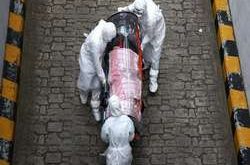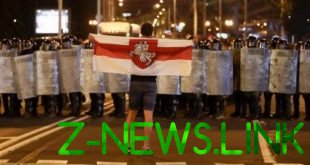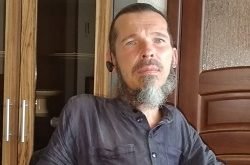
Economists Yevgeny Gontmakher and Alexander Suslin: why increasing poverty in Russia
Despite the growth of budget revenues and a stable macroeconomic situation in Russia the number of the poor.The poor in Russia already more than 20 million is 14% of the population, with the majority of families and children.According to sociologists, two thirds of the families live in the country on the model of survival and only one – third of the model development.The Russian government is political economy not programmed for development, although there are resources and poverty also comes to a standstill.Poverty is a national disgrace, especially for a rich country like Russia.
Sergei Medvedev:
We continue to explore timeless themes of Russian life. One of these stories is that Vasily Klyuchevsky brilliantly described as “state chubby people hirel”. I would like to apply these words to the present time, when it seems that the macroeconomic situation is sufficiently stable profitability in the corporate sector increases, budget indicators, and poverty is growing in Russia. Rosstat says that the poor are already more than 20 million, 14% of the population. It threatens social explosion? Can the state do to fight poverty? Moved Russia from a consumption economy to a survival economy?
Reporter:
In Russia increased the number of poor people. If last year the number of poor people amounted to 20 million 400 thousand people, now Rosstat reports that in the first quarter of 2019, this figure rose to 500 thousand. When calculating the Agency was based on the subsistence level: this amount is 10 753 ruble. Rosstat explains such data are significant as the increase of the subsistence minimum, compared with the consumer price index. With the stabilization of inflation, rising prices for food, housing and medication, and it is three important points for people. And the poorer a society is, the more you consume these positions.
Prolonged decline in incomes led to a decline in the sphere of consumption. It pulls down not only the weak revenue growth, but the VAT increase at the beginning of this year. The Central Bank is now trying to limit the growth of consumer credit in order to avoid the so-called “bubble market” and this is another blow to consumption. All of this affects the economy as a whole: decreased production in the spheres of trade, services and agriculture. The world Bank and the IMF have reduced their forecasts for economic growth of Russia this year. Now all the forecasts are in the range of 1.2–1.4%. According to the may decrees of the President of 2018 “On national goals by 2024”, the government should ensure sustainable growth in incomes and a two-fold decrease in the level of poverty. However, the preconditions for economic growth in the country.
Sergei Medvedev:
Our guest – Professor at the Higher school of Economics, member of the expert group “European dialogue” Evgeny Gontmakher and Alexander Suslinexpert “Economic expert group”.
Alexander, and what is generally considered poverty?
Alexander Suslin: Take people, look at their incomes, and all incomes below the subsistence minimum are considered poor. But this figure is very conditional, because we understand that if you get literally on the ruble more than this limit, it turns out that you’re not poor, although in fact it changes nothing.
Sergei Medvedev: And what is a living wage?
Evgeny Gontmakher: About 11 thousand. He still differentialsa: there are living wage for able-bodied people – it’s a little higher is for seniors – he’s a little smaller, and is for the kids. In addition, there is differentiation across regions.
Sergei Medvedev: How productive this technique – from the administrative, appointed and quite fictional line?
Alexander Suslin: This is the only that is.
Evgeny Gontmakher: In 1992 I was the head of the Department of labor and administered it. At the end of the Soviet time 16 years I’ve worked in the Economic Institute of the Gosplan of Russia, we, together with the Institute he worked at the USSR state planning Committee, including over consumer budgets, and we all believed. We had no concept of poverty was minimal, rational, regulatory, budget and so on. Only at the very end of the Soviet time we were able to convince Mikhail Gorbachev, and he issued a decree introduced the so-called minimum consumer budget (it was a euphemism for poverty). There was a basket, and that a living wage is built on a natural basket, where there products at a certain rate, which are necessary to maintain your physiological activity.
At the time of the end of the Soviet Union in the Russian Federation the lower the minimum consumer budget was about 15% – about the same as now. In 1992, after the start of reforms, inflation, falling incomes and so on, that figure skyrocketed to just over half of the population. Then I and my colleagues (the Minister was Alexander Shokhin) came out with a proposal to Boris Yeltsin, to temporarily enter a different poverty line. Then it was called – the cost of the physiological minimum, then removed the word “physiological”. In April 1992, was Yeltsin’s decree (we were prepared) that should continue to be regarded as the minimum consumer budget and subsistence level. The difference in cost – twice. But in the decree it was written that the physiological subsistence level is introduced at the time of an economic crisis. Then adopted and the law on the subsistence minimum, and the machine began to unfurl itself.
In the early 2000s, I told my colleagues, friends, crisis development is over, the economy is flooded, let’s get back to the minimum consumer budget. Replied: are you crazy, it’s twice, we raise the poverty line and, accordingly, the number of poor.
Sergei Medvedev: That is administratively and politically appointed hell.

Evgeny Gontmakher
Evgenie Gontmaher: Yes, and this is an outdated approach. There are several classical approaches to define poverty. This approach – the so-called basket where the norm – pounds, pieces… I remember the state Duma even once tried to count non-food items, and the deputies were arguing about how many tights lady for a year, it was the minimum with which to live. Imagine what rare nonsense! This synthetic approach has not been applied anywhere, in the US, the old fashioned way. In Europe we are talking about relative poverty. For example, does the median income in society, according to the local statistical Agency, it takes 50 or 60% and they say: here one half of median income and below poverty.
Sergei Medvedev: But if you look at median income, approximately how many of the poor in Russia?
Evgenie Gontmaher: And this is exactly the minimum consumer budget, which we have considered: 25% of our population. But why is it not applied? The fact that we have a significant portion of revenue in the shadows. In this sense, cart is more than instrumental, it is clear that you put so much meat, so much bread, you take prices and get everything.
Alexander Suslin: Yes, we have, according to various estimates, up to 40% of GDP plus to our is in the shade.
Sergei Medvedev: Is that Kordonsky is called “distributed”: garage production, Tutors, hunting and gathering, renting of apartments…
Alexander Suslin: There comes any illegal, criminal activity, and it is very important to share: when we say that 40% in the shade, this does not mean that it is 40% of accidents nannies, governesses and Tutors.
Sergei Medvedev: I want to talk about geography and social structure of poverty. I read that it mostly consists of families, including many children, and of these 20 million, nearly most are children.
Evgeny Gontmakher: a Quarter of Russian minor children live in families with incomes below the subsistence minimum.
Alexander Suslin: And there’s nothing you can do about it. If you enter some kind of benefit, for it is mainly going to the social security people with children, because everybody’s a pity to waste time picking up pieces of paper.
We have a budget, you can call the social, and about 25% of the total Federal budget and about 30% expanded, that is, the total budget, including the regions, is spent on social policy, but the horror that the money allocated for the solution of some problem, a priori considered to be her decision, but in reality it is not. We can allocate any amount of money, but they, unfortunately, do not lead to any results, often spent inefficiently. And no matter how many spoke about the need to improve the targeting of social benefits, to help really poor, there were lots of problems that pull one another, starting with how to determine who is poor and who is not, to how in a particular region will be organized social support.
Sergei Medvedev: This is actually from the Soviet Union-reaching principle is to consider the costs, not the result. After all, subjectively, almost half of people believe that they are poor, they are barely enough or not enough to live on.
Evgeny Gontmakher: this is the third approach. The first basket, the second on median income and the third is subjective, when people evaluate themselves. Now there is over, and Rosstat began to use it, when the man himself says he is deprived of something (say, a dishwasher).
Sergei Medvedev: the Definition of the middle class took a long time through the dishwasher.
Evgeny Gontmakher: There’s a lawn mower. Of course, this public standard is growing. For example, you don’t have a computer at home, your child does not have the tablet, you have no money, the child was playing football or drawing. According to research VTsIOM to the beginning of the past school year, more than half of the families had problems to collect the child in school. It may be not poverty, but the poverty. Therefore, when we talk about poverty, you need to look from different sides, that’s not what he got the figure of a living wage, we drove to the decree of the President, and all around her dance. Somewhere, maybe do a basket approach, but the suitable approach is relative, and somewhere on the sense of self of people.
A famous example of that came even before Mr Peskov. Rosstat has published a report on poverty (by the way, very interesting, it is on their website) – there are two pairs of shoes. Imagine – winter, and you only have one pair of shoes, and then something happens and you can’t go out. You must have at least two pairs of winter shoes, and then you’re not rich, but a normal person.
Sergei Medvedev: And what of geography? What regions – the poorest?
Alexander Suslin: Tyva.
Sergei Medvedev: That is a distinct division, says Natalia Zubarevich: Russia-1, Russia-2, Russia-3?
Evgeni Gontmacher:
The poorest regions – the so-called depressive regions within many subjects of the Russian North, the Central regions of the country, Siberia. It is small and medium-sized cities (especially small), the countryside.
Sergei Medvedev: But still we can confidently say that poverty in Russia has increased in recent years?
Alexander Suslin: it is safe to say that incomes are falling, and given that we have a very low standard of living, it is possible to conclude that poverty is increasing. In the story it was said that if economic growth will be what is laid, we will then be able to reduce poverty. Unfortunately, this bundle does not always work. Our economic growth is not a generalized indicator that shows how people live, as an end in itself. Sometimes we achieve some economic growth at the expense of the population, that is, there is another relationship. In normal countries all comes from the person, and then it turns out this is an indicator of high economic growth. And in the minds of decision makers, these things are inverted: the numbers for numbers, the budget surplus for the budget surplus, and not for the welfare of the population.
Sergei Medvedev: As I understand it, height is good in the corporate sector, corporations thrive. Now funds will go to the Arctic, to the weapons, there’s a new program.
Alexander Suslin: the objective in this sector is good because we have a medium-high oil price and relatively low exchange rate.
Sergei Medvedev: in General, the government needs to fight poverty? Why, for example, Igor Sechin, the fight against poverty?
Alexander Suslin: He is for anything not necessary. From the point of view of our peculiar state, it makes sense to optimize their internal utility to do the maintenance of some minimum level so as not to provoke social revolts. Whether it is the mentality, or the slave mentality, but it turns out that people are all happy. They rejoice that the master is a lovely Villa that we have a good rocket. With this mentality nothing can be done.
Evgeny Gontmakher: Who is the most active from the civil point of view in the protests of 2011-12 and now? It’s not poor people, and this is very important. Our social structure is unique, we have rich people, but very few of them. There are so-called middle class, if you follow some European standards: 15%, or even less. There are, relatively speaking, poor, poor – 25-30%, although there can be different numbers. Somewhere over half the population – the lower middle class. It is the people who in large part expect ever to enter the middle class: young and middle-aged people who have an education and some perspective. But some of them see that it was all over, no prospects. And mostly the negativity comes not from the poor, and those people who still want something, especially the young: I graduated from University, got a good education, I want a family and so on. And sociology shows that allowed rallies out people who suddenly thought: what next?
Sergei Medvedev: the higher you are on Maslow’s hierarchy of needs, the more you are dangerous to the state. Accordingly, the state must keep people down.
Evgenie Gontmaher: Yes, but our government does not understand and does not see. Good jobs in our economy very few, mostly bad jobs where you get a small salary. We have the most common salary, as shown by Rosstat, – 25 thousand rubles. Well, what can you buy for 25 thousand roubles, even in the province? You want to have your husband or wife, child, mortgage, but you can not do anything.
Alexander Suslin: But if you suddenly get sick, you just died instantly.
Evgeny Gontmakher: we have two thirds of the population has no savings. Rosstat asks the questions: do you have money for some emergency in the family? Two thirds is simply no money. And the debt load is increasing because many do not even have enough money from paycheck to paycheck: they’re taking loans, closing a loan due to another… we, unfortunately, this trend of apathy and degradation. Many people have given up.
Our economy survival. At the Institute of social policy the HSE is the study: two-thirds of families live in survival-mode, and only a third lives on the model of development, that is, there is money to somehow move somewhere in the everyday sense. The same may decree puts before us the ambitious task of telling us about the fifth economy in the world by number, about leap, about the development of innovation, where human capital? Degradation is a very bad sign.
Sergei Medvedev: In the modern world, consumption is the most important source of economic growth?
Alexander Suslin: This is one of the most important sources.
Sergei Medvedev: Russia has already given up on this hand? Earlier, between 2000 and 2014, the growth was driven mainly by consumption?

Alexander Suslin
Alexander Suslin: largely due to him. Moreover, even after the latest crisis of 2014 the consumption of pulled us growth. We have seen that the consumption is somehow growing, no matter with credits or not, but the economy somehow works, and increased VAT. And pressed consumption, our only really working driver of growth. And now consumption has dropped and people are forced to borrow to cover current expenses. And what kind of growth can we talk?
Sergei Medvedev: as far As this consumer over-indebtedness is dangerous for the economy?
Evgeny Gontmakher: the forecast of mister Oreshkina, the Minister of economic development, through two years we will approach this critical limit. This means, first of all, the collapse of the banking system because many banks will be insolvent. And there can be very unpleasant things like Bank panics, when people rush to withdraw the remaining money in the ATMs. Then the state will have to cover it with money from reserves, which we now have accumulated: the budget surplus, national welfare Fund, any record foreign exchange reserves… This is an extreme case where you really start something with the banks or some kind of social programs, and we’ll flood the market with dozens or even hundreds of billions of rubles, so the people calmed down, and so will wait for the next such episode, again accumulating money. This cash overhang that we have, it could provide the beginning of reforms.
Alexander Suslin: For reforms need political will, and we do not. We have the word “infrastructure reform” understand the money laundering and the creation of another Commission to monitor anything.
Evgeny Gontmakher: In the early 2000s, when it was organized by the Stabilisation Fund, had a terrible critic. Gref, then the Minister of economic development, said: “Give me the money and I will find the projects for which this Fund can be something to do.” He was given a small trial money. A few months later he said, “I can’t use the money. Projects no.” Because these projects must be well designed, need a feasibility study, business plans and so on.
Sergei Medvedev: Yes, the state political economy is not programmed for development, although the resources are. In this sense, the fight against poverty also runs into a dead end.
About how struggles with poverty of the Russian population, says Mitya Aleshkovsky, Chairman of the Board of the charity Fund “Need help”.
Mitya Aleshkovsky: Know what dish is now a staple in the diet of people who live below the poverty line? It is not bread, and the cheapest pasta, the horns of the lowest quality, and people buy them for the weight to be enough for a month. This, of course, does not compare with the blockade when they ate cats and dogs, but it can be compared with the hunger. People live in ramshackle huts in deplorable, unsanitary conditions, heated with wood. Most of the money goes to the communal and medicine, and remains a few thousand to them to buy those damn horns. Many people living below the poverty line in Russia, do not live in better conditions than, say, people who live in Somalia in the refugee camp where I was, and Haiti.
There is not a single public service that will support, help, humanly talk, demotiviruet person, will help him find a job, to quit drinking. Public service comes in and says: “you Have a fire situation, you don’t work, drink, and if you two months do not do repairs, we will take you children.” And takes away. But when one is on the bottom, to come to him and again hit him on the head – it’s not going to help him to get out from the bottom.
Sergei Medvedev: it Turns out that human capital in the current system of economic development the state does not need the people live from the state of grace.
Alexander Suslin: Now say that people is the new oil, and this oil just shake: what, new people…
Evgeny Gontmakher: ten Years ago, my friend Sasha Auzan talked about variants of development of Russia, and there was a script called “Boring Russia” (and he, I think, justified). There is oil, gas and forest, until all was burned and not the entire cut, there are some people who earn something, but not much, and there are people who protect: police, army, border guards have service systems – banking, insurance, and all the others live on handouts, which are obtained through the sale of these natural resources. All who were willing and able, who is more or less active, left.
Sergei Medvedev: I spoke About this and Simon kordonskii has a pipe in the pipe about 20 million people, Manager, corporations, deputies of all levels, municipal workers, plus security guards, banks, insurance, and more – 120 million people who live simply out of mercy.
Evgeny Gontmakher: this system is, unfortunately, very stable. It is not necessary to create illusions. Yes, there are some people who protest, but most of them goes down, as it was after 2011-12: either degradation, either leave or put up with this situation. “Violent” is less and less. In General, peace and quiet, but God’s grace. We go to the blockage, encapsulation of the situation in Russia. Russia in this form can survive for very long. Another thing is that it pulls in 5-th and 125-th place among the countries for quality of life, the quality of the economy around: it’s just the deep periphery. And all of this is built on the person because if we want to go there, it’s not all oil and gas, and people, but that’s what happens to a person…
Sergei Medvedev: Over time, an increasing number of the population will fall in that does not dissolve the precipitate of poverty?
Evgeny Gontmakher: the Poverty of which said Mitya, it is, of course, extreme poverty, and is 10-15%. It is distant villages, small towns, abandoned elderly people. They may be more and never will be. But for the most part it will be people with whom apparently all normal: they are dressed, shod, Yes, eat makaroshki, but with chicken, but it’s the people without movement, without energy, without desires.
Alexander Suslin: they want Only to make ends meet.
Evgeny Gontmakher: the government will give them some handouts that is not passed in extreme poverty. And money for the state and everything connected with it, as they think, is still very long enough: that’s quite a limited circle, and enough not only to live well in Russia, but also to withdraw money, to have property abroad.
Sergei Medvedev: And to maintain the illusion of geopolitical greatness.
Evgenie Gontmaher: Yes, have missiles, to participate in the regional conflicts and so on. Such a model is not registered anywhere, and no one will not say, but they have clearly sitting in the head. All their actions stem from this model.
Sergei Medvedev: And the population finds some new survival strategies, and earnings?
Alexander Suslin: he finds the shadow sector. But the shadow of a terrible not only by the fact that the budget something loses, and that creates unequal conditions for economic activity. Those economic agents who work in the shadows and don’t pay taxes, have a competitive advantage, and therefore, the budget redistributes a greater burden on the poor honest taxpayers, and they, accordingly, may not work as well as they could if they had a smaller tax burden.
Sergei Medvedev: In General, the state gets richer, the people survives. Yes, poverty is not a Vice, but it’s a shame for such a rich country as Russia. Because of its natural resources, produce value, even if in absolute terms, Russia is still one of the richest countries in the world. But the redistribution of this wealth is so flawed and wrong that we are faced with the problem of poverty – a national disgrace of the country.
© 2019, paradox. All rights reserved.





